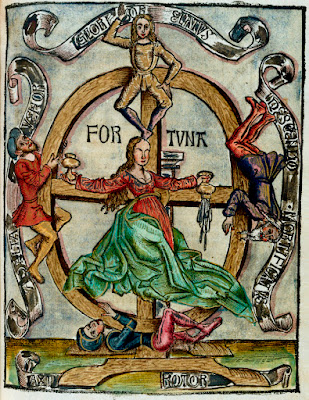[1]
Fortūne [ML
= CL: Fortūnae] plangō vulnera │ I lament the wounds of Fortune
stillantibus ocellīs, │ with dripping [flowing /
tearful] eyes
quod sua michi
[ML = CL: mihi] munera / subtrahit rebellis. │ because she rebelliously
withdraws her gifts from me
vērum est, quod
legitur │ It is true what is
read
fronte capillāta /
sed plērumque sequitur / [i] Occāsiō calvāta. │ [i] Opportunity has hair
at the front, but generally a bald patch follows
“Opportunity is
described as having hair only on the front of her head - she can be seized as
she approaches, but once she has passed, a person grabs futilely at the back of
her head.” (Betts)
calvātus, -a, -um:
bare; made bald
capillātus, -a,
-um: having hair
plangō, -ere,
plānxī, plānctus [3]: bewail; lament; mourn
sequor, sequī, secūtus
sum [3/deponent]: follow
stīllō, -āre,
-āvī, -ātus [1]: drip; trickle
stillāns,
stillantis: present active participle > ocellīs stillantibus
│ with dripping eyes
subtrahō, -ere,
-trāxī, -trāctus [3]: remove; withdraw
sua michi [dative] munera
subtrahit │ She removes / takes away her gifts from me
[2]
“In the second and third stanzas reference is made to the Wheel of Fortune, a
common motif in the Middle Ages and often represented in art, where it was
conceived as a primitive Ferris wheel accommodating four - one up, one down,
one about to achieve prosperity, one about to be plunged into misery.” (Betts)
Note in this stanza
the use of perfect passive participles and adjectives derived from them
ēlātus
coronātus
beātus
privātus
In Fortūn(a)e
soliō │ On the throne of Fortune
sēderam ēlātus, │ I had sat [pluperfect
tense] (having been) exalted (raised up; elevated) [perfect passive participle]
prōsperitātis ¦ variō
/ flōre [ablative] ¦ corōnātus; │ (having been)
Crowned [perfect passive participle] ¦ with the many-coloured
flower of prosperity
quicquid enim
flōruī │ for however (in whatever way) I have flourished
fēlīx et beātus
│ happy and blessed
nunc ā summō
corruī │ Now I have fallen down from the top
glōriā prīvātus.
│ (having been) deprived [perfect passive participle] of glory.
corruō, -ere, -uī,
corrutus [3]: fall down
solium, -ī [2/m]:
[i] seat; chair [ii] (here) throne
[i] sēderam ēlātus
│ I had sat (having been) exalted (raised up)
The verb ferō
(carry; bear), which will be discussed in greater depth in later posts, has
unusual principal parts: ferō, ferre, tulī, lātus (why that
happens will be explained)
lātus: having been
carried
Those same
principal parts will apply to compound forms of ferō:
ēlātus: having been lifted up
[ii] gloriā
[ablative] prīvātus │ deprived of glory [literally: deprived from
glory]
the ablative case
can be used to express separation from something e.g. eōs timōre
līberāvit │ he freed them from fear
[3]
Fortūn(a)e rota
volvitur; │ the wheel of Fortune is turned
dēscendō minōrātus;
│ I descend (having been) diminished
alter in altum
tollitur; │ another is raised up on high
nimis exaltātus
│ (having been) too exalted
rēx sedet in
vertice │ the king sits at the top
caveat ruīnam! │ let him beware ruin!
nam sub axe
legimus │ for below the axle we read
Hecubam rēgīnam. │ Queen Hecuba.
axis, -is [3/m]:
axle (of a wheel)
minōrō, -āre,
-āvī, -ātus [1] (late latin): reduce; diminish
vertex, verticis
[3/m]: (here) highest point; summit; top
caveat
ruīnam │ let him beware ruin; subjunctive, known in grammar as the jussive
subjunctive that forms a command / suggestion usually referring to a third
person rather than directly addressing somebody
Hecuba: “The name
of Hecuba was a suitable inscription for the axle as she was the supreme
example of Fortune's malice. From being Queen of Troy, after its sack she
suffered such misery as a captive of the Greeks that the gods, out of pity,
turned her into a dog.” (Betts)






